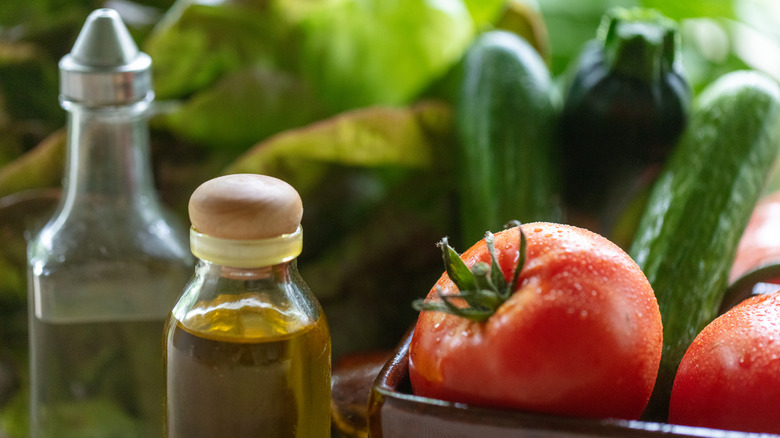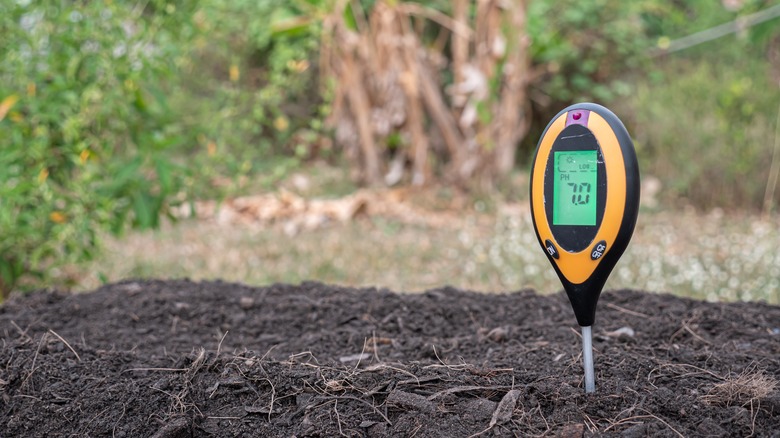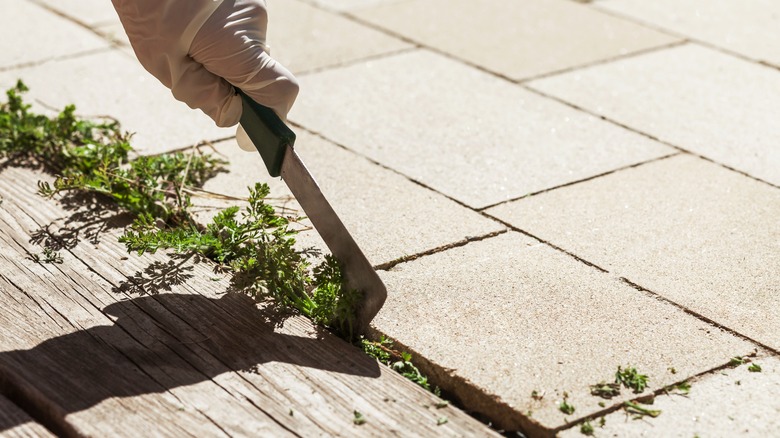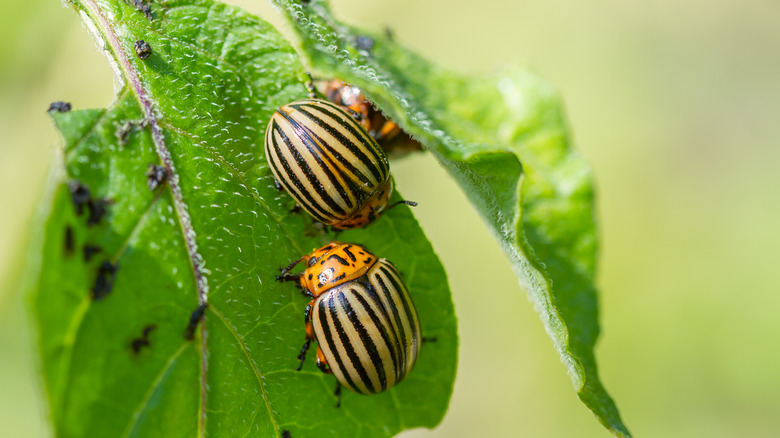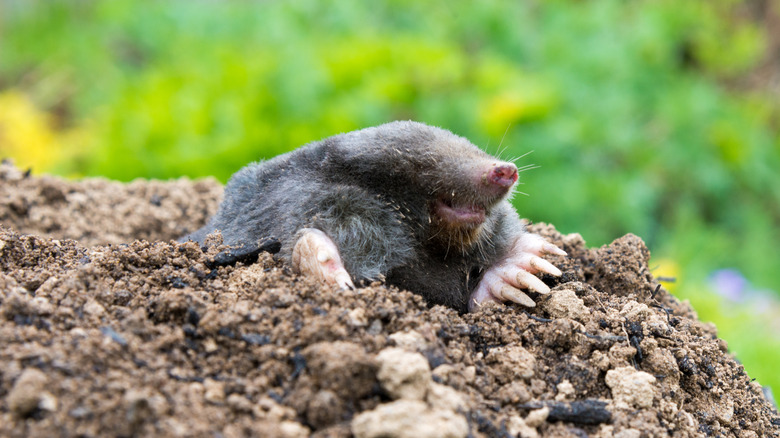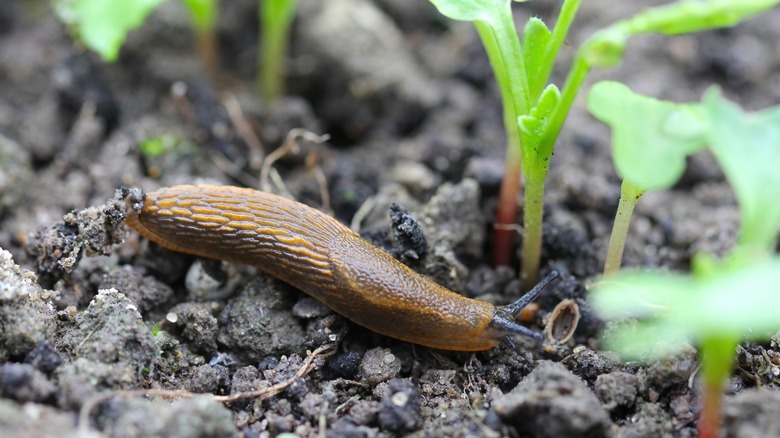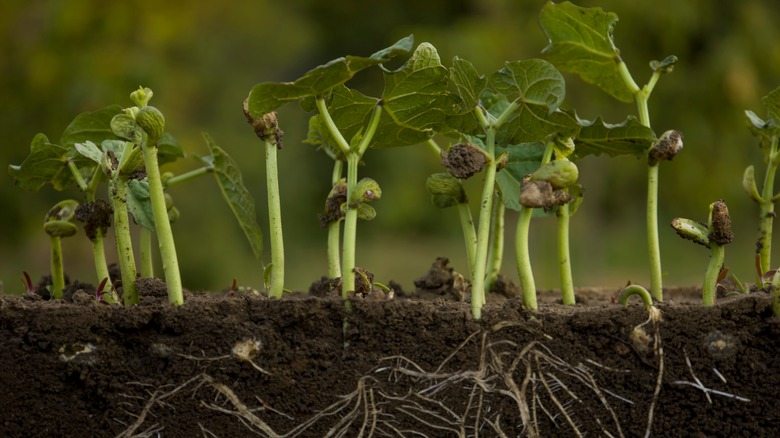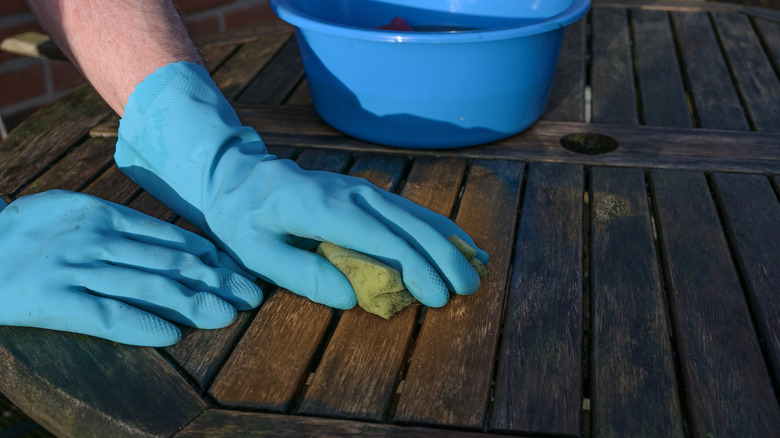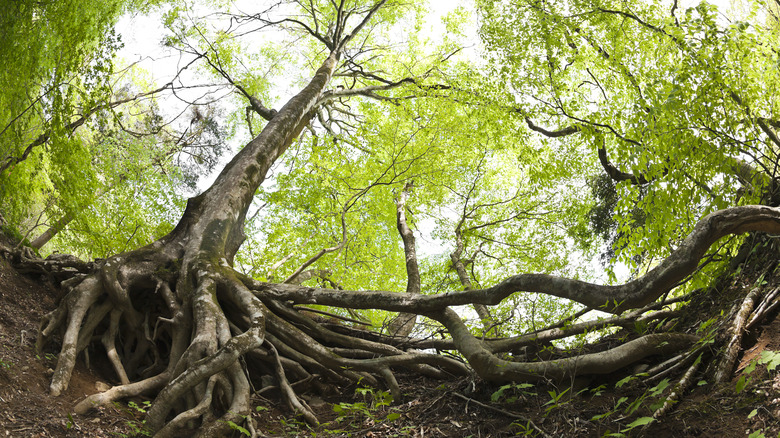Unexpected Uses For Vinegar Around Your Lawn And Garden
Though it does wonders for culinary pursuits and household chores, vinegar expands its repertoire well beyond the kitchen sink. This unassuming bottle is more than a condiment or bathroom cleaning agent; it can help in the meticulous care and maintenance of your lawn and garden.
When tending to gardens and your outdoor green spaces, vinegar steps forward as a secret weapon. We're uncovering the unexpected applications that make vinegar a powerhouse for nurturing your outdoor haven. From tackling resilient weeds to measuring soil pH, from deterring pests to rejuvenating weather-worn furniture, vinegar proves itself to be a natural and cost-effective solution, beckoning garden enthusiasts to embrace its myriad applications.
Enter a world where vinegar is transformed into a trusted companion for gardeners. Be prepared to be astonished as we unravel the green potential concealed within that modest bottle—vinegar, your surprising ally to maintain your garden's flourishing tapestry.
Use vinegar to test, but not adjust, soil pH
Understanding the pH of your soil is a crucial aspect of successful gardening. Soil pH, a measure of the acidity or alkalinity of the soil, greatly influences plant health and nutrient availability. While there are various tools available to measure soil pH, not everyone has access to them. Enter vinegar, a household item that can serve as a DIY alternative.
To use vinegar to measure soil pH, you'll need a soil sample, white distilled vinegar, and a container, according to The Spruce. Ensure the container is clean and free of any residues that could alter the reaction. Scoop soil from the locations in your garden you want to measure, as pH can vary across different areas. Remove any debris such as rocks or roots. Break up clumps and ensure the soil is dry. Vinegar reacts more effectively with dry soil. Pour a small amount of vinegar onto the soil. Observe the reaction. If the soil fizzes, it indicates alkaline soil (pH higher than 7). Additionally, the faster the fizzing, the more alkaline the soil. Slow or no fizzing suggests neutral to acidic conditions.
While vinegar is a handy tool for testing soil pH, it has limitations when it comes to adjusting pH, reports Record Searchlight. The amount of vinegar required to significantly alter the pH of the soil is often impractical. It can take large quantities of vinegar to lower the pH even slightly, making it an inefficient method for pH adjustment.
Create a natural weed killer
Weeds, the relentless invaders of our meticulously tended gardens, can be a persistent challenge. In the quest for eco-friendly and budget-conscious solutions, enter vinegar, a common household item that doubles as a potent weed killer.
Vinegar, especially white distilled vinegar, works as a weed killer through its acetic acid content (via Garden Benches). Acetic acid acts as a desiccant, drawing moisture out of plant tissues and effectively drying them out. While vinegar is non-selective, meaning it can harm both weeds and desirable plants, its targeted application can make it a valuable tool in your weed management arsenal.
Carefully spray the vinegar directly onto the weeds, ensuring it does not come into contact with your desirable plants. Optionally, mixing a small amount of dish soap with the vinegar can enhance its effectiveness. Other possible additions include salt or baking soda, which are also desiccant and can increase the potency of your solution. The soap helps the vinegar adhere to the weeds, increasing its contact time. Some weeds may require multiple applications, especially for deep-rooted or resilient varieties. Monitor the treated area and reapply vinegar as necessary.
Keep pests at bay
With its acidic properties and diverse applications, vinegar can be a valuable tool in deterring pests from invading your home and garden. Vinegar, specifically white distilled vinegar, owes its pest-deterrent properties to its strong and pungent odor, according to Homes and Gardens. The acetic acid in vinegar, while harmless to humans and pets, can be highly displeasing to many insects. Additionally, the acidic nature of vinegar can disrupt the sensory signals of certain pests, making the treated areas inhospitable for them, says Today's Homeowner.
Ants, those industrious invaders, can be effectively deterred with vinegar. Create a solution of equal parts white vinegar and water and spray it along ant trails, entry points, and around their nests. The strong scent disrupts their pheromone trails, confusing and deterring them from entering your home. Banish fruit flies from your garden by setting out a small bowl filled with apple cider vinegar and a few drops of dish soap. The scent lures the fruit flies in, and the soap breaks the surface tension, causing them to drown. The same can be done to combat gnats. Fill a jar with apple cider vinegar and cover it with plastic wrap. Poke small holes in the plastic, and the gnats will be attracted to the vinegar and get trapped.
You don't have to limit your use of vinegar to plants directly. When tending to your lawn or garden during mosquito season, mix equal parts water and apple cider vinegar in a spray bottle for a natural mosquito repellent. Apply the solution to your skin or clothing before heading outdoors.
Revive rusty garden tools and plant pots
Garden tools, despite their resilience, face the challenge of rust due to constant exposure to soil, water, and varying weather conditions. Plant pots, whether made of metal or clay, can also fall victim to rust over time. Vinegar, with its acetic acid content, provides a natural and effective solution for combating rust on these essential gardening items.
To use vinegar to clean off tools, Hellamaid explains to first dismantle the pieces if they can be disassembled. This will allow for more thorough cleaning as cleaning individual components separately is more effective than cleaning the entire appliance at once. If your garden tools have wooden handles, avoid soaking the wooden parts in vinegar to prevent potential damage. Instead, focus on the metal components.
When it comes to actually cleaning, you can opt for one of two methods: soak or spray. Your choice will likely depend on how much vinegar you have and the volume of tools that need to be cleaned. If soaking, fill a container with undiluted white vinegar and submerge the rusted parts in. After allowing them to soak for hours or overnight, use a wire brush or steel wool to scrub away the loosened rust. If spraying, fill a spray bottle with undiluted white vinegar. Liberally spray the rusted areas of your garden tools. Allow the vinegar to sit for at least 30 minutes. Similarly, use a wire brush or steel wool to scrub away the rust. For both methods, be sure to rinse the tools thoroughly with water at the end.
Deter furry invaders
The joy of a lush lawn or vibrant garden can be diminished when furry intruders decide to turn your carefully tended space into their personal playground. Faced with the challenge of keeping these animals at bay without resorting to harmful methods, enter vinegar.
Mix equal parts white vinegar and water in a spray bottle. Spray the mixture around the perimeter of your garden, focusing on areas where animals tend to enter or frequent. Vinegar's pungent odor is unpleasant for animals like cats, dogs, deer, and rabbits, says Ask Anna, making them less likely to linger in or come through treated areas.
While vinegar is generally safe for plants, some may be more sensitive to acidity. Test the spray on a small area first and avoid direct contact with plants if sensitivity is observed. If standard vinegar and water mixtures prove ineffective, you can experiment with adjusting the concentration of vinegar. However, avoid using undiluted vinegar directly on plants or in areas where it may harm vegetation. For added effectiveness, consider combining vinegar with other natural cat deterrents such as citrus peels, coffee grounds, or herbs like rosemary and lavender.
Ward off sluggish intruders
Slugs and snails, seemingly innocent creatures with their slow, deliberate movements, feed in ways that can be detrimental to gardens and plants. These mollusks are voracious herbivores, often targeting young, tender leaves, seedlings, and the lower parts of plants. They can target seedlings, fruits, and the leaves of a wide range of plants. Their feeding can result in unsightly holes, weakened plants, and even the destruction of entire crops if left unchecked. Slugs and snails can also act as carriers of plant diseases. As they move from plant to plant, they can transmit pathogens that further compromise the health of your garden.
To deter or eliminate these intruders, HGTV suggests using a solution of equal parts white vinegar and water in a spray bottle. Spray the mixture directly on slugs and snails or in areas where they are commonly found. Be sure to reapply the solution after rain or as needed. Another option is to create a protective barrier by circling vulnerable plants with a line of undiluted white vinegar. This creates an environment that slugs and snails find inhospitable, deterring them from approaching your plants. Last, mix white vinegar with salt to create a potent deterrent. Salt creates a chemical imbalance in these mollusks, killing them. Be cautious with this method, though, as excessive salt can harm plants and soil.
Accelerate seed germination
The journey from seed to sprout is a crucial phase that holds the promise of new life and flourishing greenery. Vinegar, particularly apple cider vinegar, has been commended for its ability to potentially accelerate seed germination according to a study conducted at Northern Iloilo State University.
Many seeds have a protective outer coat that can sometimes be hard or impermeable. The acetic acid in vinegar is thought to aid in softening this protective layer, making it easier for the emerging seedling to break through. Moreover, the acidic environment created by vinegar may facilitate the process of acid hydrolysis. This chemical reaction can break down complex compounds in the seed coat, allowing water to penetrate more effectively and kickstart the germination process.
To use this hack, one can mix a solution of water and apple cider vinegar (typically 1-2 tablespoons of vinegar per gallon of water). Soak seeds in this solution for a specific duration, usually ranging from a few hours to overnight, depending on the seed type. Prior to sowing, pre-soak seeds in a mixture of water and vinegar. This process allows the seeds to absorb the acidic solution, potentially expediting the germination process. Be careful though. Not all seeds respond favorably to acidic conditions. Some seeds may be sensitive to vinegar, so it's advisable to test the method with a small batch of seeds before applying it to an entire crop. Experimentation with different seed varieties can help determine the success of this method in your specific garden.
Polish outdoor furniture and accessories
Garden furniture, though designed for outdoor use, can accumulate dirt, grime, and even mold over time. Vinegar, with its natural cleaning properties, provides a safe and effective solution for rejuvenating your outdoor seating and tables. South Carolina's Department of Natural Resources states that acetic acid in vinegar is an excellent mold and mildew combatant. It helps break down and eliminate these unsightly growths on outdoor furniture. The acidity of vinegar works as a natural degreaser and stain remover, tackling dirt and grime that may have accumulated on surfaces. For water stains on metal or glass surfaces, vinegar's acidic nature aids in dissolving mineral deposits, restoring a spotless shine.
Mix equal parts white vinegar and water in a spray bottle. Spray the solution onto the furniture surfaces, focusing on areas with stains or mold. Allow the vinegar solution to sit for a few minutes. Scrub the surfaces with a brush or sponge. Rinse thoroughly with water.
Other accessories like bird feeders, essential for attracting feathered friends to your garden, can become coated with algae, mold, and debris over time. Regular cleaning with vinegar helps maintain a welcoming environment for your avian guests. Rain barrels, too, essential for harvesting rainwater for your garden, can accumulate algae and mineral deposits over time. Vinegar's acetic acid helps dissolve mineral deposits, preventing clogs in rain barrel spigots and hoses.
Root out unwanted plant systems
Trees, with their majestic presence and expansive root systems, contribute significantly to our surroundings' beauty and ecological balance. However, there are instances when tree roots become unwelcome intruders, encroaching on structures, pathways, or other plantings. As roots grow, they can exert pressure on structures like sidewalks, driveways, and foundations, causing cracks and potential damage. Tree roots seek out moisture, and underground pipes provide an attractive source. Invasive roots can infiltrate pipes, leading to blockages, leaks, and costly repairs. Aggressive tree roots can outcompete other plants for water and nutrients, affecting the health and growth of nearby vegetation. The presence of large roots near the surface can make mowing, gardening, and other lawn maintenance tasks more difficult.
With its acetic acid content, vinegar can disrupt the cellular structure of plant tissues, including roots, inhibiting growth and potentially causing them to die back. 8billiontrees recommends drilling holes into the unwanted tree roots using a drill with a long bit. Pour undiluted white vinegar into the holes, ensuring the vinegar comes into contact with the root tissues. Repeat the application periodically as needed.
This method is most suitable for managing roots causing specific problems rather than as a general root control measure for a healthy tree. Exercise caution to avoid harming nearby plants. Vinegar, especially in high concentrations, can adversely affect other vegetation. Regularly monitor the treated roots, assess the vinegar application's effectiveness, and adjust your strategy based on the observed results.
